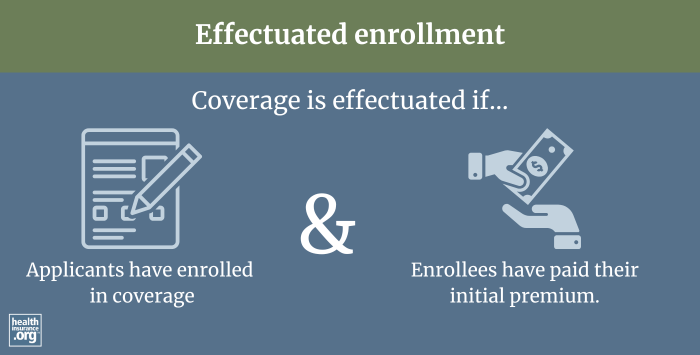
What is effectuated enrollment?
A person can enroll in a health plan (meaning they can create an account with the exchange or the health insurance company and make a plan selection) without paying any premiums. But if they don't pay their initial premium, the plan never actually takes effect – in other words, it doesn't get effectuated. So the term "effectuated enrollments" is used to describe the number of people who have enrolled in coverage and also paid whatever premiums are due in order for their coverage to take effect and remain in effect.
Millions of people enroll in individual market coverage through the ACA-created health insurance exchanges/Marketplaces each year. The federal government provides data early in the year regarding how many people selected a plan during open enrollment. But some of those people don't pay their initial premiums, and others stop paying their premiums (or actively cancel their policies) later in the year. So effectuated enrollment data give us a clearer picture of how many people actually have coverage.
During the open enrollment period for 2024 coverage, 21.4 million people selected plans in the Marketplaces nationwide.1 But as of February 2024, effectuated enrollment in the exchanges nationwide stood at about 20.8 million people.2
In the individual market, people can cancel their coverage at any point during the year, or just stop paying their premiums and the coverage will terminate. But enrollment outside of open enrollment is limited to those who experience a qualifying life event. (This differs from the employer-sponsored market, where both enrollments and disenrollments are limited to open enrollment or a special enrollment period triggered by a qualifying life event3) So effectuated enrollment in the individual market tends to peak early in the year, right after open enrollment, and then decline slowly throughout the year.
Footnotes
- ”Marketplace 2024 Open Enrollment Period Report: Final National Snapshot” Centers for Medicare & Medicaid Services. Jan. 24, 2024. ⤶
- "Effectuated Enrollment: Early 2024 Snapshot and Full Year 2023 Average" CMS.gov, July 2, 2024 ⤶
- "Section 125 Qualifying Events" PPI Benefit Solutions. Accessed Oct. 1, 2024 ⤶


